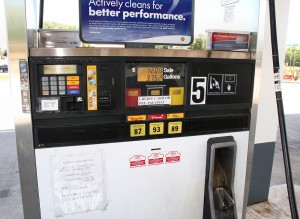From our friends at Save Jersey
by Jordan Chester Save Jerseyans: when a major public policy announcement is made on a Friday night, it usually means that our leaders don’t want us to notice it. Such an announcement was made this past Friday.
Months after the legislature stopped a gas tax increase that the people of New Jersey opposed, another plan was announced by the Governor and Legislative Leaders to fund the broke Transportation Trust Fund (TTF).
The new legislation would increase the gasoline tax by 23 cents per gallon, phase out the estate tax, gradually reduce the sales tax from 7% to 6.625%, and reduce taxes on retirement income while creating a new tax deduction for veterans. It also would increase the earned income tax credit for the working poor.

This deal, just like the proposal that was defeated this summer, would hurt taxpayers and our state’s economy.
As I stated in my article entitled Fifteen Reasons to Oppose the Gas Tax, a hike in the gas tax and a reduction in the state sales tax simply increases a regressive tax while reducing a progressive tax. As a conservative/libertarian, I disagree with those who want to soak the rich with taxes. However, I just as aggressively oppose raising taxes in a way that hurts those in middle and lower income tax brackets the most. This gas tax deal does just that.
Some Republicans in the legislature will be tempted to vote for this deal because it phases out the estate tax. While I agree that New Jersey’s estate tax is excessive because it kicks-in at a lower level than the federal estate tax, that is a separate issue from the gasoline tax and should be treated as such. Furthermore, while the estate tax needs to be lowered and probably eliminated, it’s impact is only felt by a fraction of our state’s population, whereas the gas tax would negatively impact the 6.1 million New Jerseyians with driver’s licenses.
Over the years, Trenton has broken it’s promises to the people of New Jersey. We’ve been promised better roads, that property taxes would be stabilized, and public employees have been promised better pensions. Despite these promises, Trenton has not found a way to fund the Transportation Trust Fund in years. Property taxes continue to be the highest in the nation despite a 4% cap put in place by Governor Corzine in 2007 and a 2% property tax cap put in place by Governor Christie in 2010. We’ve skipped partial pension payments most years and from 2001-2004, New Jersey made no pension payments at all.
Furthermore, Trenton has a history of raising taxes, and the people of our state are fed up with their tax & spend policies. Our leaders raised taxes and fees 110 times between 2000 and 2010 and yet, we still have one of the most underfunded pension systems in the nation, many of our roads remain in poor condition, we lead the nation in outward migration, we are second to last in the country in terms of economic growth, and our credit rating has been downgraded numerous times over the past few years.

As I stated in my article entitled Fifteen Reasons to Oppose the Gas Tax, a hike in the gas tax and a reduction in the state sales tax simply increases a regressive tax while reducing a progressive tax. As a conservative/libertarian, I disagree with those who want to soak the rich with taxes. However, I just as aggressively oppose raising taxes in a way that hurts those in middle and lower income tax brackets the most. This gas tax deal does just that.
Some Republicans in the legislature will be tempted to vote for this deal because it phases out the estate tax. While I agree that New Jersey’s estate tax is excessive because it kicks-in at a lower level than the federal estate tax, that is a separate issue from the gasoline tax and should be treated as such. Furthermore, while the estate tax needs to be lowered and probably eliminated, it’s impact is only felt by a fraction of our state’s population, whereas the gas tax would negatively impact the 6.1 million New Jerseyians with driver’s licenses.
Over the years, Trenton has broken it’s promises to the people of New Jersey. We’ve been promised better roads, that property taxes would be stabilized, and public employees have been promised better pensions. Despite these promises, Trenton has not found a way to fund the Transportation Trust Fund in years. Property taxes continue to be the highest in the nation despite a 4% cap put in place by Governor Corzine in 2007 and a 2% property tax cap put in place by Governor Christie in 2010. We’ve skipped partial pension payments most years and from 2001-2004, New Jersey made no pension payments at all.
Furthermore, Trenton has a history of raising taxes, and the people of our state are fed up with their tax & spend policies. Our leaders raised taxes and fees 110 times between 2000 and 2010 and yet, we still have one of the most underfunded pension systems in the nation, many of our roads remain in poor condition, we lead the nation in outward migration, we are second to last in the country in terms of economic growth, and our credit rating has been downgraded numerous times over the past few years.

I would respectfully ask those in favor of the gas tax one simple question. What about this legislation should make us believe Trenton will actually invest in our roads and bridges like it says? Since Governor Tom Kean left office, politicians in Trenton have promised to increase funding for the Transportation Trust Fund, and they never have.
I would also ask proponents of the gas tax why they believe that raising taxes on gasoline is the only way to invest in our roads? There is evidence to suggest that this policy is not only bad economics and bad for taxpayers, but it’s not necessary.
In my home county of Morris, the Board of Chosen Freeholders have proven that government can invest in our infrastructure without higher taxes and new borrowing. When my friend Hank Lyon became a Freeholder in 2012, he led the effort to freeze property taxes for the first time in 15 years and reduce debt by $10 million per year. At the same time, our Freeholder board worked together to fund investments in our county’s infrastructure by reforming government and controlling spending.
In order to pay for short-term infrastructure projects, state government is going to have to cut spending in other areas. Our leaders should look to abolish the TTF and begin funding road repairs through general fund revenue. That would require Trenton to cut spending and pay for priorities.
In the long-term, we aren’t going to be able to tax our way out of debt and into prosperity. We have to reduce spending, reform government, and grow our state’s economy which can be accomplished through tax reductions, regulatory reform, and other measures to encourage the free market to thrive in New Jersey.
I would also ask proponents of the gas tax why they believe that raising taxes on gasoline is the only way to invest in our roads? There is evidence to suggest that this policy is not only bad economics and bad for taxpayers, but it’s not necessary.
In my home county of Morris, the Board of Chosen Freeholders have proven that government can invest in our infrastructure without higher taxes and new borrowing. When my friend Hank Lyon became a Freeholder in 2012, he led the effort to freeze property taxes for the first time in 15 years and reduce debt by $10 million per year. At the same time, our Freeholder board worked together to fund investments in our county’s infrastructure by reforming government and controlling spending.
In order to pay for short-term infrastructure projects, state government is going to have to cut spending in other areas. Our leaders should look to abolish the TTF and begin funding road repairs through general fund revenue. That would require Trenton to cut spending and pay for priorities.
In the long-term, we aren’t going to be able to tax our way out of debt and into prosperity. We have to reduce spending, reform government, and grow our state’s economy which can be accomplished through tax reductions, regulatory reform, and other measures to encourage the free market to thrive in New Jersey.
No comments:
Post a Comment